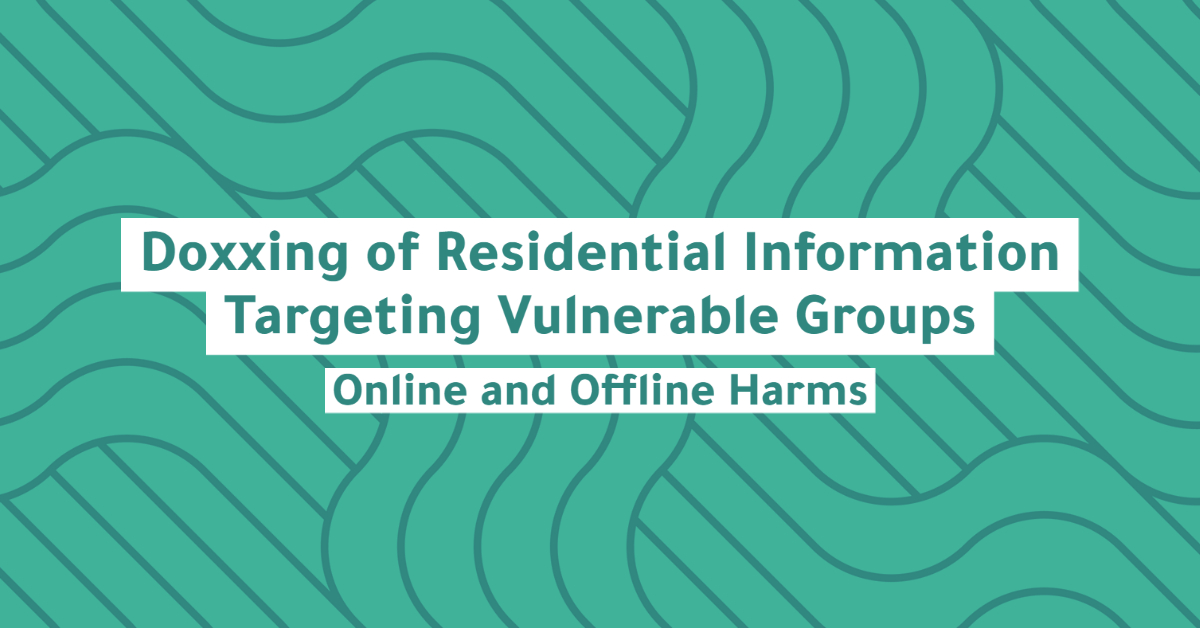As part of an Oversight Board process to issue a policy advisory opinion reviewing Meta’s policies on the sharing of private residential information, SMEX submitted a report on the doxxing of personal information—specifically residential information— and its impacts on vulnerable groups and individuals in Egypt, Jordan, Lebanon and Tunisia.
Doxxing in the Arab region is often used to target vulnerable groups and individuals such as women, human rights defenders, dissidents, minorities and LGBTQ+ and gender non-conforming people.It happens often as part of larger defamatory, hateful, and vicious campaigns aimed at discrediting and targeting the victims. The purpose is often to silence them or discredit their activism or work, and the whole movements or organizations they are affiliated with.
The doxxing, particularly of sensitive information such as residential information, puts these groups and individuals—already in a vulnerable position— at additional risks, especially vis as vis those in a position of power.
This report includes five case studies related to doxxing in the four countries mentioned above.: Three of the cases are directly related to doxxing of residential information. Due to time constraints, researchers were not able to look up cases that are more relevant. Additionally, cases of residential information doxxing seem to be less common than other forms of doxxing. So, we opted to include two additional case studies: a case study pertaining to the doxxing of a sexual harassment victim in Egypt and another case study illustrating how residential information can be easily obtained and used to threaten and dox others in Jordan.
The report is divided into five sections. The first section describes the context and the victims mostly like to suffer from the impacts of doxxing, particularly of residential information. The second section summarizes the types of information most likely to be doxxed, how and on which platforms. In section 3, the impacts on work, activism, personal life and mental health are summarized, while section 4 details how the victims have been responding to the doxxing and where they think platforms are falling short in their responses. Finally, we present a list of recommendations in the fifth section based on researchers’ suggestions and their interviews with victims.
Key Findings
- Doxxing in Egypt, Jordan, Lebanon and Tunisia seem to disproportionately impact the most vulnerable groups and individuals in society, including activists, women and LGBTQ+ people. Interviewees and researchers expressed less concern about doxxing impacting privileged individuals and those in power.
- While doxxing is a problem in the four countries, and across the wider Arab region, doxxing of residential information seems to be less common in some countries. For example, in Tunisia, the doxxing of telephone numbers is more common than that of residential information.
- The publication of copies of ID cards is one of the methods used to dox someone’s home address in Egypt and Tunisia, where ID cards contain detailed addresses.
- The case studies and other cases referenced throughout the report happened predominantly on Facebook.
- Residential information doxxing can have some serious and lasting implications for vulnerable individuals, putting their safety at risk and endangering their livelihoods and mental well-being.
- The interviewees described platforms’ responses as inadequate and insufficient in their responses to doxxing.
Recommendations
- Enhancing responses to abusive behavior, including doxxing. This can include establishing a helpline for doxxing specifically and providing a clear way to flag doxxing, or circulation of personal data that could be harmful. Responses for individuals working in activism and journalism should be prioritized. Additionally, the company can consider creating additional helplines with civil society organizations working in the region to better support at-risk groups and individuals in cases of doxxing.
- Improve process for verification of accounts. This will allow for better damage control for those affected by doxxing.
- Training and awareness campaigns: Facebook should support more training and awareness campaigns in the region on digital safety. It can also support digital security training for activists and at-risk groups.
- Empower journalists and independent media to better respond to misinformation and disinformation campaigns. Doxxing in the region usually happens as part of campaigns that are filled with hateful speech and disinformation.
Feature suggestion – safety notifications (suggested by SMEX partner, JOSA): Every-so-often, when a user is about to send a picture (whether taken in-app or not), Facebook should add a pop-up notification asking users to be mindful of what they send and think about how these images could be used to harm them.
Funding for this research was made possible by the Oversight Board (https://oversightboard.com/). The views contained in this document do not necessarily reflect the views of the Oversight Board, nor does inclusion of information in this report imply endorsement by the Oversight Board. Certain personal details from this document have been redacted to protect the interests of those involved.
You can read the Oversight Board’s advisory opinion on the sharing of private residential information via this link.
Doxxing-of-Residential-Information-Targeting-Vulnerable-Groups_-Online-and-Offline-harms-Redacted


